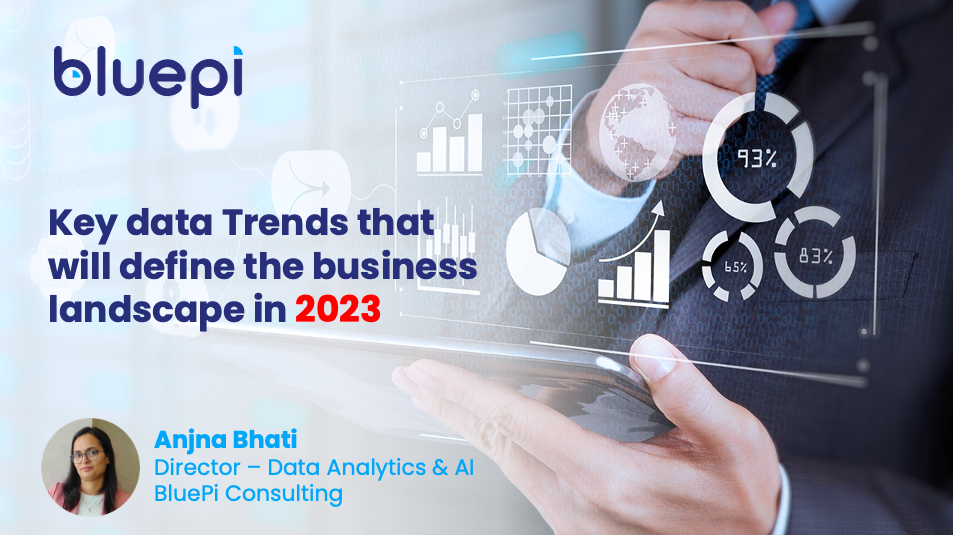Key data Trends that will define the business landscape in 2023 - Anjna Bhati , Director-Data Analytics & AI , BluePi Consulting

Irrespective of their size, businesses are certainly becoming
data-centric today more than ever before.
To succeed in a data-driven economy, organizations have to invest in the
key trends in the space which can be aligned with the business goals. Data management is driving successful
organizations where actionable insights are extracted for better planning,
quicker innovation, and more efficiency in business operations. Data acts as a differentiator for businesses
and every organization has the potential to capture it and extract insights by
leveraging the right technologies.
Data enables organizations to take action with certainty, even with other surprises such as pandemics, economic turmoil, war crisis, or natural disaster, that might occur. Data is the lifeblood that is flowing through the veins of businesses and economies.
Organizations have to act quickly to benefit from the data-driven
competitive advantage. Here are some key
data trends that describe the business landscape and drive growth in the coming
days.
Increase in demand for data democratization
Gone are the days when the power of data was in the hands of limited teams in an organization. They were mostly data analysts, data scientists, or data engineers who were equipped with the skills to interpret the data for business benefits. Other employees, a majority who lacked the expertise and training to extract insights for decision-making could not leverage the data for their tasks. In contrast, today with the advent of technologies, even non-technical employees can comfortably work with the data without assistance from experts. This data democratization empowers all employees within the organization to equally gain from the process, irrespective of their technical expertise. In the coming year, more democratized data will be seen across business environments and business units including marketing, finance, HR, shopfloor, and frontline staff, among other functions. This culture will give rise to streamlining internal processes, and creating higher quality products and services, leading to resource optimization and enhanced customer experience. Going forward, data democratization will be the best way to manage big data and extract its value.
Data-as-a-Service (DaaS) to gain a wider
reach
DaaS technology uses the cloud to analyze and manage data. This can be leveraged for business intelligence tools or data warehouses. Subscribers to this service can access, use and share files on the internet. Data is industrialized and provided to the user on demand by reusable data engines. The DaaS providers are curating and analyzing data from multiple sources to customers as a package of services. The several benefits of DaaS include agility, better data quality, and cost-effectiveness. With high-speed internet being used nowadays, this service has the potential to reach a wider audience. This pay-as-you-go subscription-based model is convenient as organizations need not invest in building their own data collection and storage systems and data science operations for several application types. The market for DaaS will increase significantly in 2023.
Real-time data analytics to attract further
attention
The steady growth of real-time data analytics in recent times is a clear indication of how organizations value it. In 2023, more organizations across industry verticals will use the technology across business units making it to the mainstream. Capturing insights from data brings more advantages if organizations are aware of what is happening in real time than otherwise. This real-time data is valuable and requires sophisticated and advanced data strategies to analyze it and will provide the organizations a competitive edge. The technology will have a greater number of users across sectors in the coming year. From companies that are into financial services to the players in the retail sector, real-time data is used to deliver better customer experience and forecast future market demands for organizations across all industry verticals.
The growing importance of Data Governance as
a discipline
With refined data now considered a key asset, organizations are required to follow all relevant regulations to protect citizens from privacy violations. Data Governance as a discipline involves a set of principles, policies, and principles that are designed to manage and govern data throughout its lifecycle. An effective data governance framework will establish the constant availability of the data while ensuring it is trustworthy and secure. In 2023, data governance will become a necessity for all organizations to follow, irrespective of their activities and fields. Data Governance aims to enhance data security, and monetize data besides leveraging it to make business decisions. It also supports meeting regulatory requirements besides increasing the value of the data. A good data governance framework should also define responsibilities and accountabilities for various functions. It should be documented for relevant users across finance, sales, production, procurement, and legal business units.
A McKinsey research report says that data-driven enterprises are 23
times more likely to acquire customers, 6 times as likely to retain customers,
and 19 times as likely to be profitable as a result. Data is the heart of any organization or economy’s
success in addition to fueling its future growth and development. Data Science
and Management are undoubtedly augmenting human potential and driving higher
business value. Data Analytics and
Business Intelligence play a key role in predicting new trends, and identifying
growth opportunities that lead to business continuity while enhancing
profitability.



